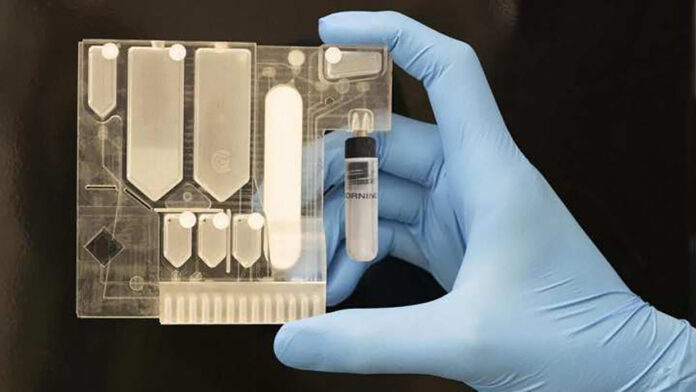HUNTSVILLE – Biotechnology company GeneCapture is using a $100,000 Innovate Alabama matching grant to expand the testing of their first portable human infection detection and antibiotic susceptibility testing for military personnel, into testing animal health as well.
Being able to include agricultural infections is a concern to food health and food security worldwide. Animal diseases such as avian flu and foot-in-mouth disease threaten the lives of millions of livestock. Gross economic costs suppressed before the last outbreak of the H7N9 avian virus totaled $380 million.
GeneCapture recently won a $250,000 Small Business Innovative Research grant to advance its work with the Defense Health Agency. The SBIR grant made the company eligible for the Innovate Alabama supplemental funding to support the growth of small businesses.

“Innovate Alabama is helping innovators grow roots within the state by providing resources, like the Innovate Alabama Supplemental Grant Program, to assist business leaders who are looking for support in bringing their products to market,” said Cynthia Crutchfield, Innovate Alabama CEO.
GeneCapture’s rapid infection detection platform and antibiotic susceptibility platform are designed for point of care medicine.
“GeneCapture’s system identifies the molecular sequence of the pathogen using a rapid RNA-based signature match,” said Paula Millirons, chief scientist at GeneCapture. “Most of GeneCapture’s development has focused on human health for civilian and military populations. However, adding probes for animal pathogens is a simple extension of the platform.”
GeneCapture has begun collaborating with Auburn University’s College of Veterinary Medicine to speed up testing and field applications.
“Rapid on-site pathogen detection will become an important tool to enhance animal production, health, welfare, and address agricultural and food security issues,” said Dr. Xu Wang, associate professor of Comparative Genomics in Animal Health at the College of Veterinary Medicine. “We are looking forward to exploring GeneCapture’s novel platform as a part of this Innovate Alabama award.”
Ten years ago, technology entrepreneur and GeneCapture co-founder Peggy Sammon teamed up with Dr. Krishnan Chittur, professor emeritus at the University of Alabama in Huntsville and a chemical engineer with a good understanding of the molecular side of life sciences.
“Because of Dr. Chittur’s work at UAH, we had an idea about developing a product and building a product that would be helpful to human health, but in the early days, it was just a scientific idea written on paper,” said Sammon. “We spent the next five years or more seeing if we could build a product around the idea.”
Since then, Sammon said GeneCapture has licensed a patent from UAH and added inventions to the original idea.
GeneCapture has prototypes that can detect infected wounds among military service personnel and quickly recommend the best antibiotic for use on that wound.
“We are working with the Defense Health Agency at the Department of Defense to develop, build and test portable systems that are capable of being used in remote operations and in places where there is no lab nearby,” Sammon said.
The HudsonApha human testing requirements need Federal Drug Administration clearance.
FDA testing has begun using lab prototypes.
“On the human side, we will bring the technology to the FDA within the year for testing and their analysis,” said Sammon.
The agricultural health testing requires approval from the U.S. Department of Agriculture and Sammon said they believe in about a year, they will have it ready for farm use.
“It will be the first time prototype testing has moved from human to animal,” Sammon said. “We have not decided exactly which pathogen to test yet, but companion animals, perhaps fish, veterinarians and farms will be the biggest beneficiaries.
“Starting something that has never been built before is very exciting.”
Don’t miss out! Subscribe to our email newsletter to have all our smart stories delivered to your inbox.



